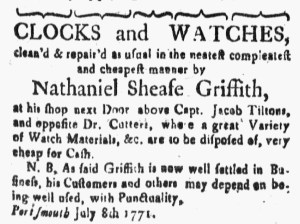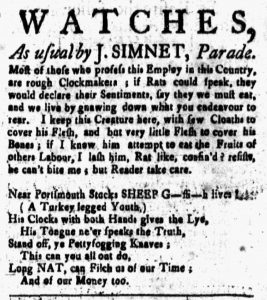What was advertised in a colonial American newspaper 250 years ago today?

“Clocks & Watches Clean’d in the Cheapest and best Manner.”
Nathaniel Sheaff Griffith made brief appeals to price and quality in an advertisement that ran in the May 1, 1772, edition of the New-Hampshire Gazette. He succinctly informed prospective customers that he “Clean’d” clocks and watches “in the Cheapest and best Manner” at his shop in Portsmouth. In addition, he sold “Silver plated Shoe and Knee-Buckles” and other goods.
While this advertisement may not seem noteworthy when considered alone or alongside other notices that ran in the same issue, regular readers of the New-Hampshire Gazette likely remembered other advertisements placed by Griffith or that mentioned Griffith. For a period of eighteen months, Griffith participated in a feud with another clock- and watch-maker, John Simnet, an exceptionally public disagreement undertaken in advertisements in the colony’s only newspaper. Simnet had relocated to New Hampshire after several decades working in London. Like many artisans who crossed the Atlantic, he attempted to leverage his training and experience in the cosmopolitan center of the empire to woo customers unfamiliar with his work. His competitors, including Griffith, benefited from having established a reputation among local consumers. Simnet adopted more aggressive tactics than most artisans, not only promoting his own credentials but also proclaiming that his rivals did inferior work that actually damaged the clocks and watches they pretended to repair. He singled out Griffith in particular, eventually denigrating his character and intellect as well as his skill. For his part, Griffith accused the newly-arrived Simnet of being an itinerant likely to abscond with the watches that colonizers entrusted to him. In general, however, Griffith was much less abusive toward Simnet than Simnet was toward him, at least in the public prints.
After a year and a half in Portsmouth, Simnet relocated once again, this time to New York. He placed fairly neutral advertisements in the newspapers published in the bustling port, at least at first, but eventually found himself embroiled in another argument with a competitor. His advertisements became increasingly colorful as he devised new ways to denigrate clock- and watchmaker James Yeoman.
Back in Portsmouth and its environs, many readers of the New-Hampshire Gazette likely remembered the altercation between Griffith and Simnet when they encountered new advertisements from Simnet, no matter how brief or neutral. Did those memories influence whether they hired Griffith? Did they think about some of the insults that Griffith leveled at Simnet? Did they put any stock in Simnet’s accusations against Griffith or dismiss the cantankerous rantings of the interloper? Did they credit Griffith for the restraint he showed when he eventually decided that the best response to Simnet was to ignore him? Did they recall being entertained by the vitriolic exchanges, even if they had no need to hire artisans to clean or repair their clocks and watches? Griffith’s brief announcement published in the spring of 1772 was just one notice among a series of advertisements that likely shaped public perceptions of his business.









